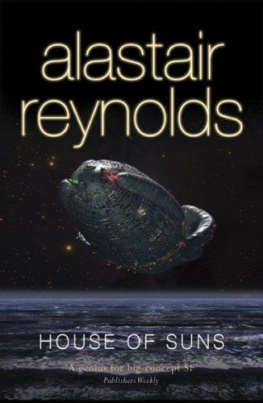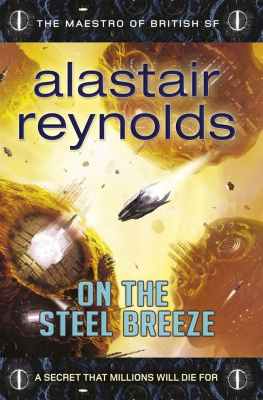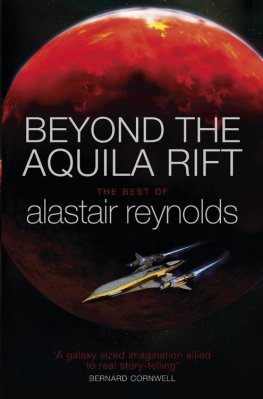Absolution Gap
by Alastair Reynolds
The Universe begins to look more like a great thought than like a great machine.
SIR JAMES JEANS
For my Grandparents.
She stands alone at the jettys end, watching the sky. In the moonlight, the planked boarding of the jetty is a shimmering silver-blue ribbon reaching back to shore. The sea is ink-black, lapping calmly against the jettys supports. Across the bay, out towards the western horizon, there are patches of luminosity: smudges of twinkling pastel-green, as if a fleet of galleons has gone down with all lights ablaze.
She is clothed, if that is the word, in a white cloud of mechanical butterflies. She urges them to draw closer, their wings meshing tight. They form themselves into a kind of armour. It is not that she is coldthe evening breeze is warm and freighted with the faint, exotic tang of distant islandsbut that she feels vulnerable, sensing the scrutiny of something vaster and older than she. Had she arrived a month earlier, when there were still tens of thousands of people on this planet, she doubted that the sea would have paid her this much attention. But the islands are all abandoned now, save for a handful of stubborn laggards, or newly arrived latecomers like herself. She is something new hereor, rather, something that has been away for a great whileand her chemical signal is awakening the sea. The smudges of light across the bay have appeared since her descent. It is not coincidence.
After all this time, the sea still remembers her.
We should go now, her protector calls, his voice reaching her from the black wedge of land where he waits, leaning impatiently on his stick. It isnt safe, now that theyve stopped shepherding the ring.
The ring, yes: she sees it now, bisecting the sky like an exaggerated, heavy-handed rendition of the Milky Way. It spangles and glimmers: countless flinty chips of rubble catching the light from the closer sun. When she arrived, the planetary authorities were still maintaining it: every few minutes or so, she would see the pink glint of a steering rocket as one of the drones boosted the orbit of a piece of debris, keeping it from grazing the planets atmosphere and falling into the sea. She understood that the locals made wishes on the glints. They were no more superstitious than any of the other planet dwellers she had met, but they understood the utter fragility of their worldthat without the glints there was no future. It would have cost the authorities nothing to continue shepherding the ring: the self-repairing drones had been performing the same mindless task for four hundred years, ever since the resettlement. Turning them off had been a purely symbolic gesture, designed to encourage the evacuation.
Through the veil of the ring, she sees the other, more distant moon: the one that wasnt shattered. Almost no one here had any idea what happened. She did. She had seen it with her own eyes, albeit from a distance.
If we stay her protector says.
She turns back, towards the land. I just need a little time. Then we can go.
Im worried about someone stealing the ship. Im worried about the Nestbuilders.
She nods, understanding his fears, but still determined to do the thing that has brought her here.
The ship will be fine. And the Nestbuilders arent anything to worry about.
They seem to be taking a particular interest in us.
She brushes an errant mechanical butterfly from her brow. They always have. Theyre just nosy, thats all.
One hour, he says. Then Im leaving you here.
You wouldnt.
Only one way to find out, isnt there?
She smiles, knowing he wont desert her. But hes right to be nervous: all the way in they had been pushing against the grain of evacuation. It was like swimming upstream, buffeted by the outward flow of countless ships. By the time they reached orbit, the transit stalks had already been blockaded: the authorities werent allowing anyone to ride them down to the surface. It had taken bribery and guile to secure passage on a descending car. Theyd had the compartment to themselves, but the whole thingso her companion had saidhad smelt of fear and panic; human chemical signals etched into the very fabric of the furniture. She was glad she didnt have his acuity with smells. She is frightened enough as it is: more than she wants him to know. She had been even more frightened when the Nestbuilders followed her into the system. Their elaborate spiral-hulled shipfluted and chambered, vaguely translucentis one of the last vessels in orbit. Do they want something of her, or have they just come to spectate?
She looks out to sea again. It might be her imagination, but the glowing smudges appear to have increased in number and size; less like a fleet of galleons below the water now than an entire sunken metropolis. And the smudges seem to be creeping towards the seaward end of the jetty. The ocean can taste her: tiny organisms scurry between the air and the sea. They seep through skin, into blood, into brain.
She wonders how much the sea knows. It must have sensed the evacuation: felt the departure of so many human minds. It must have missed the coming and going of swimmers, and the neural information they carried. It might even have sensed the end of the shepherding operation: two or three small chunks of former moon have already splashed down, although nowhere near these islands. But how much does it really know about what is going to happen? she wonders.
She issues a command to the butterflies. A regiment detaches from her sleeve, assembling before her face. They interlace wings, forming a ragged-edged screen the size of a handkerchief, with only the wings on the edge continuing to flutter. Now the sheet changes colour, becoming perfectly transparent save for a violet border. She cranes her head, looking high into the evening sky, through the debris ring. With a trick of computation the butterflies erase the ring and the moon. The sky darkens by degrees, the blackness becoming blacker, the stars brighter. She directs her attention to one particular star, picking it out after a moments concentration.
There is nothing remarkable about this star. It is simply the nearest one to this binary system, a handful of light-years away. But this star has now become a marker, the leading wave of something that cannot be stopped. She was there when they evacuated that system, thirty years ago.
The butterflies perform another trick of computation. The view zooms in, concentrating on that one star. The star becomes brighter, until it begins to show colour. Not white now, not even blue-white, but the unmistakable tint of green.
It isnt right.
Ararat, p Eridani A System, 2675Scorpio kept an eye on Vasko as the young man swam to shore. All the way in he had thought about drowning, what it would feel like to slide down through unlit fathoms. They said that if you had to die, if you had no choice in the matter, then drowning was not the worst way to go. He wondered how anyone could be sure of this, and whether it applied to pigs.
He was still thinking about it when the boat came to a sliding halt, the electric outboard racing until he killed it.
Scorpio poked a stick overboard, judging the water to be no more than half a metre deep. He had hoped to locate one of the channels that allowed a closer approach to the island, but this would have to do. Even if he had not agreed to a place of rendezvous with Vasko, there was no time to push back out to sea and curl around hunting for something he had enough trouble finding when the sea was clear and the sky completely empty of clouds.
Scorpio moved to the bow and took hold of the plastic-sheathed rope Vasko had been using as a pillow. He wrapped one end tightly around his wrist and then vaulted over the side of the boat in a single fluid movement. He splashed into the shallows, the bottle-green water lapping just above his knees. He could barely feel the cold through the thick leather of his boots and leggings. The boat was drifting slowly now that he had disembarked, but with a flick of his wrist he took up the slack in the line and brought the bow around by several degrees. He started walking, leaning hard to haul the boat. The rocks beneath his feet were treacherous, but for once his bow-legged gait served him well. He did not break his rhythm until the water was only halfway up his boots and he again felt the boat scrape bottom. He hauled it a dozen strides further ashore, but that was as far as he was prepared to risk dragging it.













